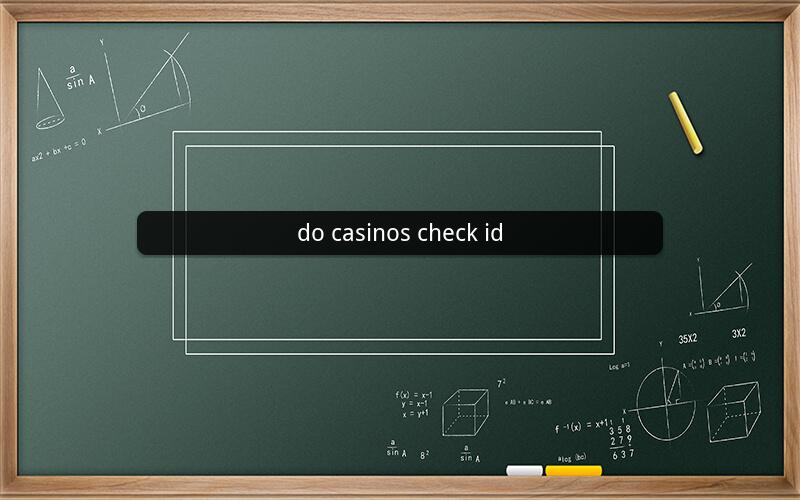
Table of Contents
1. Introduction
2. Why Do Casinos Check IDs?
3. The Importance of ID Verification in Casinos
4. Types of ID Checks Performed by Casinos
5. The Process of ID Verification
6. Challenges and Concerns
7. Legal and Regulatory Aspects
8. Conclusion
1. Introduction
Casinos are popular entertainment destinations that attract millions of visitors each year. They offer a wide range of games, from slot machines to table games, and provide a thrilling experience for those who enjoy gambling. One of the key security measures implemented by casinos is the requirement for customers to provide identification (ID) upon entering the venue. This article delves into the reasons behind this practice, the importance of ID verification, and the process involved.
2. Why Do Casinos Check IDs?
Casinos check IDs primarily for the following reasons:
a. Age Verification: Ensuring that individuals are of legal age to gamble is crucial for responsible gambling practices. Most jurisdictions have set a minimum age limit for gambling, typically 21 years old.
b. Preventing Fraud: Verifying customers' identities helps casinos detect and prevent fraudulent activities, such as using stolen or fake IDs.
c. Compliance with Regulations: Casinos are required to comply with various laws and regulations, including anti-money laundering (AML) and know your customer (KYC) requirements.
d. Security and Safety: ID checks contribute to maintaining a safe and secure environment within the casino.
3. The Importance of ID Verification in Casinos
ID verification plays a vital role in the following aspects:
a. Ensuring Responsible Gambling: By verifying the age of customers, casinos can ensure that only those who are legally allowed to gamble are admitted.
b. Preventing Criminal Activities: ID checks help in identifying individuals who may be involved in criminal activities, such as money laundering or illegal gambling.
c. Enhancing Customer Trust: Implementing ID verification measures helps build trust among customers, as they feel their personal information is protected.
4. Types of ID Checks Performed by Casinos
Casinos employ various methods to verify the identity of their customers:
a. Driver's License: One of the most common forms of ID used for verification. It provides information about the individual's age, name, address, and photo.
b. Passport: For customers visiting from other countries, a passport is often accepted as valid identification.
c. State Issued ID: In some cases, a state-issued ID may be accepted as an alternative to a driver's license.
d. Military ID: Active-duty military personnel can use their military ID for verification purposes.
5. The Process of ID Verification
The process of ID verification in casinos typically involves the following steps:
a. Customer Presents ID: Upon entering the casino, the customer is required to provide their ID for verification.
b. Staff Review ID: Casino staff carefully examine the ID to ensure its authenticity and verify the customer's identity.
c. Age Verification: If necessary, additional age verification methods may be employed, such as checking the customer's date of birth.
d. Entry Granted: Once the ID is verified, the customer is allowed entry into the casino.
6. Challenges and Concerns
While ID verification is essential, it also poses certain challenges and concerns:
a. Privacy Concerns: Customers may have concerns about the privacy of their personal information, as it is shared with casino staff.
b. Time-Consuming Process: In some cases, the ID verification process can be time-consuming, leading to delays for customers.
c. Inaccuracy: Mistakes in ID verification can occur, leading to false positives or negatives.
7. Legal and Regulatory Aspects
Casinos are subject to various laws and regulations regarding ID verification. These include:
a. Age Verification Laws: Casinos must comply with the age verification laws of their respective jurisdictions.
b. AML and KYC Requirements: Casinos must implement AML and KYC measures to prevent money laundering and illegal activities.
c. Data Protection Laws: Casinos must adhere to data protection laws to safeguard customers' personal information.
8. Conclusion
ID verification is a crucial aspect of casino operations, ensuring responsible gambling, preventing fraud, and complying with legal requirements. While there may be challenges and concerns, the importance of ID verification cannot be overstated. Casinos must continue to evolve their verification processes to adapt to changing regulations and maintain a safe and secure environment for their customers.
Questions and Answers:
1. Q: What is the primary reason for casinos to check IDs?
A: The primary reason is to verify the age of customers and ensure they are of legal age to gamble.
2. Q: How does ID verification help in preventing fraud?
A: It helps by identifying individuals who may be using stolen or fake IDs for fraudulent activities.
3. Q: What types of ID are commonly accepted by casinos for verification?
A: Driver's licenses, passports, state-issued IDs, and military IDs are commonly accepted.
4. Q: Can customers enter a casino without showing their ID?
A: No, customers are required to provide their ID for verification upon entering the casino.
5. Q: Is there a minimum age for gambling in all jurisdictions?
A: No, the minimum age for gambling varies by jurisdiction, with 21 being the most common minimum age.
6. Q: What happens if a customer's ID is lost or stolen?
A: The customer should report the loss or theft to the casino and seek assistance in obtaining a replacement ID.
7. Q: Can ID verification be conducted remotely?
A: Yes, some casinos may use remote ID verification methods, such as video calls or online platforms.
8. Q: Are there any privacy concerns associated with ID verification?
A: Yes, customers may have concerns about the privacy of their personal information, which is shared with casino staff.
9. Q: Can ID verification processes be improved?
A: Yes, casinos can improve their ID verification processes by implementing advanced technology and training staff on best practices.
10. Q: Are there any legal consequences for not complying with ID verification requirements?
A: Yes, casinos may face legal consequences, including fines and penalties, for failing to comply with ID verification regulations.